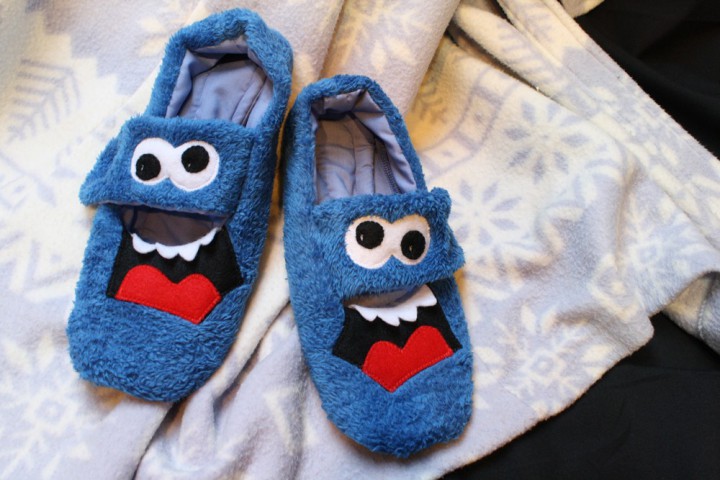Job Interview First Impressions – The Fuzzy blue Slippers!
 You have an interview for the career opportunity of your dreams. Energy and excitement pulse through you as you push open the door to the lobby of your future company. Moments later, you are shaking hands with your prospective employer who invites you to be seated. As you wait for the first interview question, you glance down and discover that you are not wearing your well-polished business shoes but your favourite fuzzy blue slippers. A scream of horror rises in your throat.
You have an interview for the career opportunity of your dreams. Energy and excitement pulse through you as you push open the door to the lobby of your future company. Moments later, you are shaking hands with your prospective employer who invites you to be seated. As you wait for the first interview question, you glance down and discover that you are not wearing your well-polished business shoes but your favourite fuzzy blue slippers. A scream of horror rises in your throat.
The average first impression is made in less than 15 seconds but it may be the only impression that influences the outcome of your interview. Will your interviewer remember how well you grasped the complex issues and opportunities of the job? Or will the only thing to survive the interview be his (or her) unfavourable impression of your fuzzy blue slippers?
Dressing appropriately for a job interview is one of the most powerful ways to favourably influence that first impression. Lesley Everett, author of Walking Tall: Key Steps to Total Image Impact, writes that in 15 seconds “we have got key clues into how somebody operates, into their business approach, their attitude, their personality.”
Antonio Centeno, President of A Tailored Suit, believes that “What you wear to an interview is important because it is a factor you can control, unlike factors such as who will interview you or what questions will be asked. Not dressing appropriately is one of the most common ways job seekers shoot themselves in the foot; it immediately signals to the interviewer that you did not properly prepare and damages your chances for the position. In today’s ultra-competitive job market, why would you let something so simple get in your way?”
Choice of interview attire has international commonality but regional differences. Job candidates everywhere are advised to be clean, well groomed, and attired appropriately to the corporate culture or job.
It is easy to be aware of appropriate business attire in your own community or country. But it can be challenging to know the business attire expectations of other European Union (EU) member states. There is no standardized dress code for interview or business attire within the EU. Among the five general recommendations:
1. Choose conservative attire and accessories
2. Avoid extremes of attire and hair styles
3. Candidates should always be clean and well groomed
4. Women should limit jewellery to few pieces of modest design; in some countries, men are advised to avoid wearing any jewellery other than a wedding ring
5. Many EU employers frown upon body piercings and tattoos; these forms of body art are expected to be appropriately covered at all times
The European Commission has prepared an online publication (“Ready to Make the Move”) to help job seekers learn about career opportunities, job searches, and cultural differences in business attire and conduct within each of the 28 EU member states:
- Sweden, Cyprus, Norway, Bulgaria, Czech Republic, Iceland, and Finland generally favour casual business attire that is not too formal but not sporty or relaxed. Emphasis is on what is appropriate to the company or actual job. Suits and ties for men and dresses or suits for women are more typically expected of management level employees.
- EU countries with more traditional attire include the United Kingdom, Portugal, Lithuania, Malta, Netherlands, and Denmark.
- Other EU member states’ business attire preferences fall somewhere in the middle between traditional/conservative and the more casual styles.
Extremes of attire and grooming are not acceptable at anytime, anywhere. You understand the importance of that first impression and you want to prepare well in advance of your appointment. But what if you have no idea of the business attire of your future company?
Pamela L. Leri, a Senior Vice President of Human Resources Manager with the Mellon Financial Corporation suggests that you consider these questions:
- What are the local expectations for establishing credibility?
- Are these expectations different for local people than they are for foreign nationals?
- How do these expectations differ from what you are accustomed to?
Start your research by reading about the culture of the country and speaking with people who have lived and worked in the area of your target job. Internet business articles and images of business attire may also offer valuable guidance (include a search of your prospective employer’s website, too).
Sam Bisby, “Preparing for Job Interviews: Big Companies vs. Small Companies” writes, “If you are not sure what is appropriate for the interview, contact the office ahead of time to ask; they will likely be impressed by your conscientiousness and your attention to detail.” Most career advisors agree that this is a safe and appropriate approach for obtaining the information you need.
Remember the fuzzy blue slippers? RELAX! It was a bad dream. You are well-prepared. You are confident of your appearance and the knowledge and skills you have to offer. Your future employer begins the interview. (And your fuzzy blue slippers are waiting for you at home – where they belong.)

